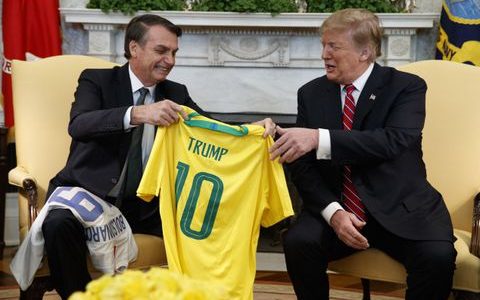In the United States, 2016 was the year that we witnessed a lot of political and social change because of one important election. For Brazilians, that year has been 2019. The newly elected President, Jair Bolsonaro, has changed not only the reality of Brazil but is also impacting the lives of people all around the world because of his unorthodox policies. Bolsonaro’s leadership – or lack thereof – and personality is often compared to those of Donald Trump. The “Trump of the Tropics” resembles the former TV star because of his right-wing nationalism, militarism and, most importantly, his long history of sexist, homophobic, racist, and intolerant behavior.
A house representative since the 1990s, Bolsonaro has been in the political scene for decades but has never caused any meaningful impact, having never passed any bills under his authorship or made any real difference in Congress. He has built his career in Brazilian politics from his many encounters with his female colleague, Maria do Rosário, of whom he once stated that he would never rape because she was too ugly, implying she didn’t deserve the act. The parallels between Bolsonaro’s comment and President Trump’s infamous “grab them by the pussy” are clear.
However, it wasn’t just through offending his coworkers that Bolsonaro began to be noticed. He has also attacked both the LGBTQ+ community – “nobody likes homosexuals, we just tolerate them” – and the Black community – “my son would never come home with a Black woman, I taught him better than that”. The rhetoric from both Trump and Bolsonaro regarding minorities is strikingly similar. This prompts the question of, years after the Trump election, how a nation would choose to put another Trump-like figure in power? How could another powerful nation choose to condone rather than condemn blatant racism, sexism, and homophobia?
The similarities between Donald Trump and Jair Bolsonaro do not end with hateful rhetoric: their rise to power have also drawn comparison. Both men painted a picture of their nations as if they were in decline and both propagated the belief that they would be the unconventional politicians to make their country “great again” as they were outsiders that loved order, praised religion, and traditional family values. Both countries had grown tired of typical politicians, and in Brazil we saw a rise of corruption as the economy tanked. Brazilians wanted to see structural change post-impeachment of the last President, and Bolsonaro’s anti-establishment rhetoric resonated with both the upper class, who wanted more economic liberalism and a cut of social programs, and the lower class, naive enough to follow his extremism.
Bolsonaro spent his entire campaign stating his disbelief in climate change and his desire to utilize Brazil’s biggest contribution to the world, the Amazon Rainforest, for economic development. This meant deforesting as much as possible for maximum economic advantage. Bolsonaro, like Trump, has dismissed the science proving climate change as fake news and has pushed against environmental regulations, specifically criticizing the Paris Climate Accord. The former legislator criticized environmentalists’ focus on protecting the Amazon as “environmental psychosis” and appointed a fellow climate change denier as the Secretary of Environment.
Just like throughout President Trump’s campaign, Bolsonaro had explicitly stated how he would deal with issues, regardless of whether these ideas were orthodox or not, and he has followed through as much as possible. Both Presidents have utilized their rhetoric of fighting for democracy to install a semi-authoritarian government based on political division that emphasizes a false dichotomy: the right as always right and the left as propagator of fake news.
It’s obvious that every country has its own unique issues and people do not always agree with their elected officials. However, when extremists promote policies that affect more than just their country or continent, but instead affect the entire world a real concern begins. So when Bolsonaro encouraged loggers to deforest the Amazon for economic development, he became responsible for one of the biggest man-made fires that resulted in an 82% increase of flames from last year.
Doing this, Bolsonaro subverted the country’s century-long commitment to protecting the forest and predictably called any reports of deforestation fake news. In addition, the president rejected twenty million dollars in international aid to stop the fire and instead met with Donald Trump to ensure both the U.S. and Brazil were aligned politically. Trump then tweeted an offer of support to help to stop the fires, but one of the Brazilian ministers denied that a conversation surrounding the fires took place between the presidents. There is a clear irony in the politicians who complain so much about fallacies from the media being the ones who propagate lies. Trump and Bolsonaro are experts at utilizing lies to establish power, and both are responsible for the harm being experienced in nations outside of their power-hungry domestic bubbles.
The Amazon fire continued burning for over two weeks, and eventually could be seen from thousands of miles away. This would be like if someone in Florida could see the ash from a fire all the way in Wisconsin. The president decided to use his favorite tool, the Army, in an attempt to “solve” the same crisis he does not believe exists in the first place, but was ultimately responsible for. This mirrors President Trump’s hijacking of military resources in an effort to portray a strong image of masculinity and superiority in crises that need actual solutions.
Jair Bolsonaro’s attempt to be Donald Trump has resulted in him enacting policies that reflect the attitudes of his American colleague. What he doesn’t realize, though, is that he is in charge of a country that is not the U.S. Bolsonaro cannot change the Brazilian reality just because of his desire to be American. Instead, he will eventually just harm entire populations that depend on Brazilian resources across the globe, including the place he is most concerned about: the United States of America.


